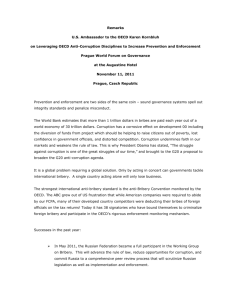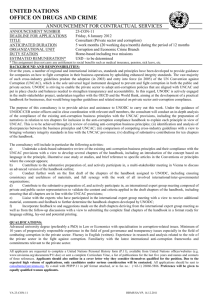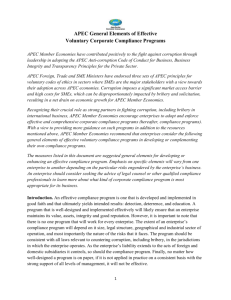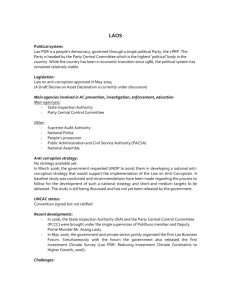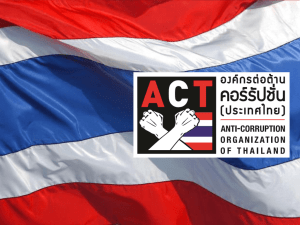26-27 January 2013 - Meeting Document Database
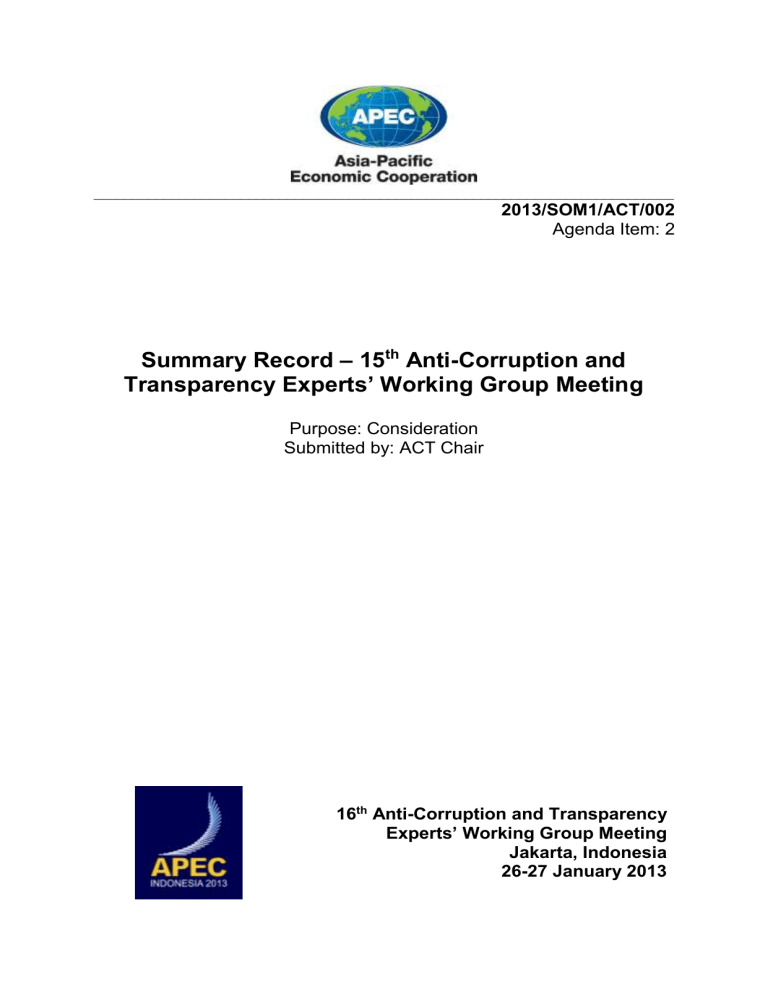
___________________________________________________________________________
2013/SOM1/ACT/002
Agenda Item: 2
Summary Record – 15
th
Anti-Corruption and
Transparency Experts’ Working Group Meeting
Purpose: Consideration
Submitted by: ACT Chair
16
th
Anti-Corruption and Transparency
Experts’ Working Group Meeting
Jakarta, Indonesia
26-27 January 2013
Summary Record
APEC AntiCorruption and Transparency Expert’s Working Group Meeting
26 th May, 2012. Kazan, Russia (SOM 2)
Executive Summary
The 15th meeting of the APEC AntiCorruption and Transparency Expert’s Working Group (ACTWG) was held in Kazan, Russia, on May 26th, followed by the Workshop on Fighting Foreign Bribery in
APEC Economies organised by ACTWG and OECD on May 27 th , and followed by the ABAC-ACT
Public-Private Partnership and Dialogue: Anti-Corruption and Illicit Trade, on May 28 th .
The plenary meeting was chaired by the ACT Chair, Mr. Timur Eyvazov, Deputy Director of the Department of Economic Cooperation, Ministry of Foreign Affairs of Russia.
The meetings were attended by 18 of the 21 APEC member economies (all except Canada, Mexico and New Zealand) as well as representatives from OECD, UNODC, and the World Bank.
Key outcomes of the plenary 15th ACTWG meeting include:
ACTWG members endorsed the 14th ACT Meeting Summary Record.
Discussion on the ‘Vladivostok Declaration on Fighting Corruption’ previously drafted by Russia and circulated for members comments. ACT Members supported the revised final text; however some delegates needed to come back to their capitals for confirmation. The document will be presented to
Senior Officials, as well as to APEC Ministers, and -if possible- to the APEC Leaders.
Updating on Interim Reports on implementation of APEC Anti-Corruption commitments submitted intersessionally. Shortly after the meeting the final consolidated document compiling fifteen reports was circulated electronically in pdf format. The document will be presented to Senior Officials and Leaders, and will be uploaded on the ACT webpage.
Members reported on their economies’ progress to implement the UNCAC, the OECD Anti-Bribery
Convention, and other Initiatives relating to Anti-Corruption and Transparency.
Members received reports from International Organizations UNODC, The World Bank, and OECD on their Anti-Corruption activities and Synchronizing with APEC ACTWG.
The next ACTWG plenary meeting will be held in Jakarta, Indonesia in January or February 2013
(tbc).
Workshop on Fighting Foreign Bribery in APEC Economies
On 27, May 2012 ACT members attended the ‘Workshop on Fighting Foreign Bribery in APEC Economies ’ jointly organised by APEC-Anti-Corruption and Transparency Working Group (ACTWG) and the Organisation of Economic Co-operation and Development (OECD), hosted by the Russian Federation. Experts from member economies, special guests of governmental agencies and representatives of OECD Anti-Corruption Division and of World Bank StAR Initiative, shared relevant information and leaded open discussions on several relevant subjects related to the fight against foreign bribery.
The main themes of the workshop were:
1.
2.
International Framework to Fight Foreign Bribery,
National Experiences in the Fight against Foreign Bribery
3.
4.
The Battle on the Front Line: Challenges for Law Enforcement
Preventing and Detecting Foreign Bribery
ABAC-ACT Public-Private Partnership and Dialogue: Anti-Corruption and Illicit Trade
On May 28, 2012 in Kazan, Russia ACT members attended the ABAC-ACT Public-Private Partnership and Dialogue: Anti-Corruption and Illicit Trade.
The two Panels were:
1. Public – Private Cooperation to Combat Corruption, and
2. Public – Private Cooperation efforts to combat illicit trade.
Summary Record
APEC AntiCorruption and Transparency Expert’s Working Group Meeting
26 th May, 2012. Kazan, Russia (SOM 2)
Opening Remarks
The ACT Chair Mr. Timur Eyvazov welcomed all the participants of the meeting in Kazan. The ACT
Chair acknowledged the excellent work done by ACT members during the last meeting in Moscow, where members approved the 2012 ACT Work plan, and reported on initiatives and progress on anticorruption and transparency commitments. Mr Eyvazov also thanked ACT members for their support to the proposed ACT-OECD Workshop on Fighting Foreign Bribery in APEC Economies, and the ABAC-ACT Public-Private Partnership and Dialogue. Mr. Timur Eyvazov also expressed his appreciation for the members’ work on the ‘Vladivostok Declaration on Fighting Corruption’, of which draft was circulated intersessionally. The ACT Chair also recalled on the work plan presentation made by the independent assessor on ACT work, which will be completed by end of September 2012, as well as the presentation made by OECD representative on OECD Anti-Bribery Convention, and the presentation made by Russian representative on Russian priorities for APEC 2012.
Agenda Item 2- Adoption of the Agenda
ACT members adopted the agenda of the 15th ACT Meeting.
ACT members approved the Summary Record of the 14th ACT meeting held in Moscow in February
2nd-3rd 2012.
Agenda Item 3 – APEC Secretariat Report
The APEC Secretariat provided an update on Project Management prepared by the APEC Project
Management Unite for SOM2 & related meetings, May-June 2012. APEC Secretariat also outlined some Key Developments of APEC since SOM1 meetings.
Agenda Item 4 – Progress and Implementation of ACT Work Plan 2012 - Outcomes and Deliverables for ACT 2012
ACT vice Chair Mr David Luna (USA) highlighted that ACT is truly engaged to take advantage on the opportunities and resources by continue developing excellent capacity buildings exercises in APEC e.g. the proposed Chile and Thailand Multi-year project.
Mr Luna shared with members his view on the ACT progress regarding financial disclosure and combating illicit trade, recalling USA report on APEC Principles for Financial/Asset Disclosure by
Public Officials shared to ACT members in SOM1 in Moscow. The report mentioned how ACT members might work in implementing those areas which are part of the 5 years ACT mid-term strategy, and also what it has being done in terms of projects in the last couple of years. ACT is making innovative initiatives, and the assets disclosure work is one of them. He highlighted how the
ACT work on disclosure principles can be reflective in important high level fora like the G-20 this year.
Illicit Trade is another important area where ACT has been advancing, and will be further discussed during the ACT –ABAC Dialogue on 28 th May, integrated with Anti-Corruption area. The overall ACT work on combating corruption has clear linkages with the work of other international organizations, such as UN-CSD, WTO, OECD, and the World Bank, as well as the private sector. ACT may lend its expertise to other APEC group such the Sustainable Development.
• ‘Vladivostok Declaration on Fighting Corruption’
ACT Chair invited the distinguish ACT members to discuss on the Declaration on Fighting Corruption’
(Doc 009), which draft was circulated for ACT members’ comments and contributions two months prior the meeting. Some economies have sent their comments intersessionally (USA, Hong Kong
China, Japan and Canada). Australia, Brunei-Darussalam, Chile, Korea supported the document, though Australia would send some wording electronically during the session.
China supported the declaration in principle, but still had a different opinion on several points. China proposed to add a couple of sentences consistent with its domestic legislation on the page 2 and asked to make changes in text, basically on the UNCAC provision. China also proposed to delete the
sentence of OECD Anti-Bribery Convention, since China is not part of the OECD. China would send the additions in writing and would need to come back to the capital for confirmation. Hong Kong China in principle supported the declaration, but needed more time for the particular wording. Indonesia supported the declaration and proposed to add two wordings in the first and second page on globalization and illicit networks. Japan explained briefly the reason of adding the proposed sentence related to OECD Anti-Bribery Convention.
Malaysia and Papua New Guinea supported the declaration and China ’s idea. Peru also supported the declaration but needed more time for checking and having home’s official decision. The
Philippines agreed with the declaration, and supported the proposal of USA on open governance, as well as the proposal of China and agreed to delete the proposed sentence related to OECD.
Singapore supported in principle the declaration, but shared the concern rose by China on OECD
Convention. Singapore also needed more time to go back home for final approval. Russia supported the Declaration on Fighting Corruption and welcomed that the document reflected all ACT work and activities and priorities of this year specially the sentence on Public-Private Partnership. Chinese
Taipei fully supported the declaration and agreed with Chinese proposal, particularly with the one of
OECD Convention and on the UNCAC, as Chinese Taipei is not member of them. Nevertheless it stated that its policy is to implement both conventions. Thailand accepted China ideas, but would confirm by the following day. USA supports the statements and thanks the colleagues for proposals.
USA supported Chinese suggestions regarding the request to member economies to ratify the OECD
Anti-Bribery convention and welcomed the work of ACT in particularly to this subject as well as the chance to work together with the ACT Chair and China to draft this important part of the document.
Viet Nam supported the declaration, as well as the China proposal on OCED Convention. Viet Nam also supported Indonesia’s idea of adding more wording on globalization and cooperation against illicit networks. Chile pointed out that the ACT meeting was a good chance to discuss the new proposals on the draft which was previously circulated to ACT members. Chile also encouraged the colleagues who would come back home for more inputs to do it hopefully within the current ACT meetings so that the Vladivostok Declaration could be ready before the upcoming CSOM meeting in September, since there would not be other chance during the rest of the year.
ACT-OECD Workshop Fighting Foreign Bribery in APEC Economies
The ACT Chair Mr Timur Eyvazov gave the group an update on the ACT-OECD Workshop Fighting
Foreign Bribery in APEC Economies that would be held the next day, on 27 May. Explained that idea of this workshop was APEC economies to share their experiences on the matter learn from each other and exchange information on those experiences. He invited the Head of Anti-Corruption Division,
Directorate for Financial and Enterprise Affairs of OECD, Mr Patrick Moulette to share some words on this workshop, as he played a major role in organizing the event.
Mr Patrick Moulette expressed OECD was very interested in the workshop for interaction and exchange of views and experiences within the context of APEC. He believes APEC to be very relevant in the world’s economy, a dynamic forum in the region and in the matter of business extension outside borders which faces the problem of foreign bribery, which is a very important global issue. He welcomed and looked forward to participate in the APEC-OECD discussion of fighting foreign bribery, pointing out that APEC, OECD, UNO and the World Bank are all part of this anticorruption framework.
ACT/ABAC Dialogue on Combating Corruption to Promote Economic Growth and
Competitiveness.
The ACT Chair Mr Timur Eyvazov shared some words of introduction on the upcoming gave the group on ACT/ABAC Dialogue on Combating Corruption to Promote Economic Growth and
Competitiveness that would be held on 28th May. He highlighted the importance of that dialogue and then Public-Private Partnership, outlining the two main issues, the first more focused on corruption and the second on the issue of illicit trade. The dialogue was organized and would be conducted by the ACT Vice Chair, Mr David Luna.
2011 AELM Commitment: Regular Reporting and Progress on Implementing APEC
Commitments on ACT Reporting Template.
Mr Timur Eyvazov reminded on the ACT group’s agreement reached during the last ACT meeting in
Moscow to submit the economies’ Interim Reports on implementation of APEC Anti-Corruption commitments. The document would be presented to Senior Officials during CSOM. Although some economies would need more time to submit the interim report, Russia would print and circulate a single compiled document with the received reports. As per Chile’s suggestion, the final consolidated document was circulated electronically in pdf format. Shortly after the meeting the final document was circulated compiling fifteen reports from: Brunei Darussalam; Chile; China; Hong Kong China;
Korea; Indonesia; Japan; Malaysia; New Zealand; Russia; Singapore; Chinese Taipei; Thailand; USA;
Viet Nam.
Agenda Item 05: UN Convention against Corruption (UNCAC)
The ACT Chair Mr Timur Eyvazov invited ACT members to report on development on implementing the UN Convention Against Corruption (UNCAC) and other initiatives related to anti-corruption and transparency.
Philippines briefed on the status of its implementation of UNCAC, focusing on the assessment process. Philippines pointed out its fully compliance of a significant number of articles of the
Convention.
Malaysia updated on governments progresses in order to comply UNCAC, highlighting that most of its articles have been embedded into domestic legislation. He also updated on Malaysian Anti-Corruption
Commission MACC initiatives and the 6th IAACA Annual Conference and General Meeting to be held in Malaysia in 2012 (meeting d oc Nr 004 ‘Anti-Corruption Initiatives in Malaysia’).
Thailand also briefed on recent developments on the implementation of UNCAC, mentioning activities and efforts made by the Office of the National Anti-Corruption Commission of Thailand NACC, including the upcoming ‘Workshop on Effectively Combating Corruption and Illicit Trade through
Tracking Cross –Border Financial Flows, International Asset Recovery and Anti-Money laundering
Effort s’, to be held in Phuket in 11-12 July (meeting doc Nr 005), as well as other workshops and collaboration at bilateral and regional level within Mekong region and ASEAN.
Peru shared updates on the measures adopted by the Peruvian government in order to implement
UNCAC, including the visit of experts from Bolivia and Ecuador who assessed Peruvian progress of implementation of chapters 3 and 4 of the Convention. Peru also updated on government initiatives like the Conflict of Interest s’ Declaration Law, the ‘Observatory of Corruption’ for prevention of corruption in the public sector, and the Action Plan on Open Government Partnership.
Russia shared with ACT members its view on the impact of corruption in economy, democratic institutions and the public system, stressing that fighting against corruption is a high priority for the current government. Russia highlighted the vigorous steps towards fighting corruption in recent years made by a number of government agencies, such as the Ministry of Justice, Public Prosecutors,
Ministry of Interior, Federal Security, etc. The government has further improved the anticorruption legal framework, acknowledging UNCAC and OECD Anti-Bribery Convention as important international instruments, and stated it’s willing to collaborate with all APEC partners both bilaterally and multilaterally in fighting corruption.
Chinese Taipei updated on its progress in enforcing UNCAC since its last report shared in the previous ACT meeting in Moscow. Chinese Taipei stressed that in the last months has adopted a number of measures. In the frame of its own Code of Conduct in Public Sector established in 2008 aligned with UNCAC requirements-, Chinese Taipei created a new public anti-corruption scheme involving all ministries, departments and agencies in order to establish their own ‘Honorable and
Proper Performance of Public Functions ’. It mentioned further measures in preventing and punishing bribery from companies participating in governmental procurements, as well as a public campaign for enhancing transparency in the sector of water resource administration.
Korea briefed on its regular implementation of UNCAC, internally ratified in 2008. Anti-corruption and
Civil Rights Commission of Korea has submitted implementation reports on prevention of corruption areas in two occasions to UNODC. In June this year Korea will be reviewed on implementations of
Chapter 3 and 4 of the Convention. Korea recently participated in IACA training initiatives, after its
ratification in 2011. Korean government has also presented a legal initiative in the area of preventing conflicts of interest of public officials.
Papua New Guinea gave a general review on its progress in implementation of UNCAC, of which is member since 2007. Following this, the government drafted the National Anti-corruption Strategy in
2009 approved by the National Parliament in 2011. The National Strategy fully complies with UNCAC and focuses in fighting against corruption and improving level of good governance, strengthening systems and processes. The government also proposed to the Parliament the creation of
Anticorruption Commission and other legal initiatives. This year PNG will have the peer review on implementations of Chapter 3 and 4 of the UNCAC.
Indonesia shared its report with the ACT members (meeting doc Nr 013) , ‘Indonesia Progress on
UNCAC Implementation’). Indonesia will set out National Strategies on Corruption Prevention and
Enforcement as the national platform to fight against corruption, and also that is is in the process to draft the amendments of Anti-Corruption Law, Mutual Legal Assistance law and Extradition Law.
Brunei Darussalam shortly reported on its progress in implementation of UNCAC, of which is member since ratification in 2008. This year Brunei Darussalam was reviewed in the implementation of
Chapter 3 and 4 of the Convention by peer members. Brunei Darussalam is working on its anticorruption act in compliance with UNCAC.
Australia updated on the process of peer review of implementation of UNCAC, which is currently undergoing, acknowledging the valuable insights of the review team on developments in Australia’s
National Anticorruption Plan. Australian Parliament recently presented a discussion paper on Code of
Conduct, and soon it will consider establishing a Parliamentary Integrity Commission. Australia also updated on its initiative of Public and Private Sector Consultations on Facilitations Payments. In 2011, the Home Affairs Ministry launched a public consultation paper to seek interested stakeholder views on possible changes to Australia’s anti ‑ foreign bribery laws. The consultation period ended in
February 2012. Regarding OECD Convention, Australia’s anti-foreign bribery regime is being reviewed by the Working Group on Bribery, to be completed later during the year.
Viet Nam reported on its progress in anticorruption focusing on improvements of its legal anticorruption framework and the implementation of UNCAC, ratified by Viet Nam in 2009 (Meeting doc Nr 008). Viet Nam ratified the Government UNCAC implementation Plan, and concordantly in
2010 adopted its National Strategy against Corruption 2010-2020. Both documents are now Viet
Nam’s priorities for the improvement of legal framework on anticorruption for this period of time. In
2011 the National Assembly of Viet Nam issued the Law on Citizens Complaints, and the Law on
Citizens Denunciations, both to be in act later this year. Now the government is drafting the relevant decrees for their implementation. The National Assembly is currently discussing the draft Law on Antimoney laundry, hopefully to be adopted in 2012, and in 2013 it will review amendments of a number of important laws on anticorruption. During this year Viet Nam has finalized the reviewing of Five-year
Implementation of the Law on Anti-corruption, issued in 2005. Viet Nam also conducted the evaluation of the first step of its 3 steps-divided National Strategy against Corruption.
China briefed on its progress on implementation of UNCAC, ratified in 2005, and in act since 2006. In order to fulfill international obligations China established an inter-departmental coordination, including
25 government departments in charge of coordinate the UNCAC implementation, especially to ensure the compatibility of China internal legislation with the UNCAC requirements. In 2006 China enacted the Anti-money laundry law. In 2007 it was established the National Bureau of Corruption Prevention
NBCP, for international cooperation and technical assistance under UNCAC framework. Since 2008
NBCP has annually held the international Corruption Prevention Workshop, becoming an effective platform for agencies of as many as 35 countries to exchange experiences and discuss about best practices in fighting corruption. In 2011 China amended the Criminal Law setting the bribery of foreign public officials as a crime. In 2014 China will reviewed on its implementation of UNCAC and it is confident that the progresses made by the government will be appreciated.
The USA reported on three developments. The US’ UNCAC implementation review was completed last year, and its full self-assessment, as well as the executive summary of its report, is available on
UNODC website. The US government passed last month (April 2012) the STOCK Act (Stop Trading on Congressional Knowledge Act). This new law, which is very much aligned with APEC Principles on
Financial Disclosure, establishes new requirements preventing Executive Branch and Congressional
Members officials and employees from trading on material non-public information they obtain based on their position or responsibilities. The US also reported on an initiative that it has been supporting, along with Interpol and StAR, called the ‘Global Asset Recovery Focal Points Initiative.’ This initiative consists of a network of investigators and prosecutors that fosters relationships, promotes better understanding of respective legal frameworks, and facilitates informal cooperation, helping practitioners work together to pursue asset recovery cases. This network also provides participants and economies the opportunity to informally consult on cases. The conference currently gathers its
104 members twice a year to discuss developments on legal frameworks and new practical tools.
The US encourages all economies to consider participating in the next conference as observers (will hold on 16-18/7/2012).
Hong-Kong China informed that UNCAC requirements (which came into force at the same time with
China) have been fully implemented by the existent legislation and administrative measures of HKC.
With regard to denying safe haven to officials and individuals guilty of public corruption, HKC is fully committed to the implementation of the FATF Recommendations. HKC has signed bilateral and multilateral agreements to provide assistance and cooperation in a number of areas covered by the
UNCAC. Aligned with Leader’s declarations HKC is committed to keeping up the momentum in enforcing the anti-corruption law, preventing corruption, enhancing transparency and promoting effective control and good governance in both the public and private sectors. HKC will also continue to provide capacity building training for public and private sector. HKC will continue to build upon existing networks for regional and international cooperation, and will continue to share its experiences and initiatives with other APEC member economies (See doc: Hong Kong China ACT Interim Report Hong
Kong China 2012).
Representatives of the Ministry of Economic Development of the Russian Federation updated ACT members on developments regarding the initiative of Lobbying used as a Tool for Combating
Corruption and Ensuring Transparency (Meeting doc Nr 012), under the Nation Plan of Combating
Corruption of the Russian Federation. In order to promote different Public-Private Partnership forms the document proposes ACTWG to consider exploring this issue, that may include -among other actions- to discuss and share best practices on activities of the lobbying institutions within APEC economies; to develop recommendations to draft the universal Code of Ethics for lobbyists and to promote the Transparency and Integrity Standards for lobbyist groups; as well as to cooperate in this matter with other international stakeholders, like OECD, UNODC and WTO.
Chile would be glad to receive updates from Russia on this initiative. Indonesia highlighted the importance of this issue and expressed that it will welcome any workshop regarding lobbying and how to fight corruption and transparency, as well as how it can apply in the international dialogue. Australia commented on the Australian Lobbyists Code of Conduct established three years ago and it will be glad to share with ACT members the experiences gathered until now. Peru commented on the Lobby
Law of Peru issued in 2004. China expressed also a high interest in Russian proposal, and that it is looking forward to share best practices and regulating lobbying activities. It pointed out that lobbying is now a big concern in China in its efforts of fighting corruption. ACT Chair suggested considering a future ACT workshop on this subject with the participation of interested APEC economies, since some of them have developed regulatory systems regarding lobbying that can be shared among economies which do not have it yet.
Agenda Item 06 – Reports on Ongoing and Proposed Projects and ACT Initiatives and Related
Synergies with Other Relevant International Fora
Thailand updated ACT members on the ‘Workshop on Effectively Combating Corruption and Illicit
Trade through Tracking Cross –Border Financial Flows, International Asset Recovery and Anti-Money laundering Efforts: Its Impact on Poverty Reduction and Economic Growth ’, to be held on 10 th -11th
July, 2012 in Phuket. Thailand gave details on the workshop’s schedule organized by NACC (Meeting doc Nr 005). Formal invitation letters to ACT members were recently sent out. Thailand thanked the co-sponsors economies: USA, Australia and Hong Kong China. ACT Chair encouraged all members to participate in this event. Russia strongly supported this event.
The Philippines updated members on the seminar/workshop ‘Implementation of the APEC Code of
Conduct for Business (Integrity and Transparency Pri nciples for the Private Sector)’ to be held on 20-
21September 2012 in Manila (Meeting doc Nr 006). The Philippines updated on the number of speakers and participants confirmed so far, and gave details on the seminar’s schedule. Chile -which is in contact with the Construction Chamber for this event- thanked the invitation and will answer it soon. Australia highlighted the Philippines ’ work on Code of Conduct for Business. Russia fully supported the initiative of the Philippines considering it as very timely, especially regarding Russian chairmanship of upcoming APEC’s Leaders meeting in Vladivostok.
Thailand updated ACT members on the Chile-Thailand proposal of the Multi-year project, "Capacity-
Building Workshops on Designing Best Models on Prosecuting Corruption and Money Laundering
Cases Using Financial Flow Tracking Techniques and Investigative Intelligence for Effective
Conviction and Asset Recovery to Promote Regional Economic Growth". The Concept Note of this project just received approval in principle by APEC BMC session 2.
Thailand and Chile thanked all the co-sponsoring economies which expressed their support at the
Concept level and asked the same unanimous support for the next step as Project Proposal. Chile encouraged all members to participate in this big event which will be carried out in three phases throughout the 3 ½ years of its implementation. The first part will be a workshop to be held in Chile, secondly a workshop in Thailand, and finally the issuing of an Anticorruption Prosecutor’s handbook compiling best practices. A guideline will be sent out to ACT members for gathering data on each economy’s corruption prosecution system. Members will be required to present the data in the workshop. The first workshop will have the purpose of presenting the corruption prosecution systems and the second one will have the purpose of carry on the capacity building activity. Finally a soft and hard copy of the handbook will be distributed to ACT members. Chile encouraged all ACT members to participate in the project and asked for their cooperation and help to make this project a success.
USA fully supported this valuable initiative of Chile and Thailand, highlighting that it certainly follows some of the Leader’s priorities. Russia also fully supported the project, pointing out on its good response to ACT medium term work plan, as well as APEC Leader’s commitment to promote capacity buildings initiatives on financial investigations, international assets recovery and anti-money laundry tools.
Viet Nam joined the other economies in their views, and briefed on its cooperation efforts with international anticorruption forum, the ADB/OECD Anti-Corruption Initiative for Asia Pacific Region, established in 1999. Today the initiative gathers annually experts from 29 countries of the Asia-Pacific region who have committed to action against corruption: they have jointly developed the Anti-
Corruption Action Plan for Asia and the Pacific and work together towards its implementation. Viet
Nam is an active member since 2004 and it will be the host of the upcoming 17 th Initiative Steering
Group Meeting, to be held in Hanoi on 22nd October, followed by a regional seminar on 23-24
October 2012. The invitations to the meeting and the seminar will be sent to ACT members in August.
Viet Nam also briefed on the Initiative Strategy and Work Plan 2012-2014, under the ADB/OECD Anti-
Corruption Initiative for Asia Pacific Region. The 15th Steering Group meeting in Kuala Lumpur in
2010 adopted the policy document Initiative’s “Strategic Principles and Future Activities”, which guides its operation in the future. The Initiative is a regional forum for supporting national and multilateral efforts to address and reduce corruption in Asia and the Pacific, primarily through the effective implementation of UN Convention against Corruption (UNCAC).
Agenda Item 07 – Report from International Organizations on their Anti-Corruption activities and
Synchronizing with ACT
Mr Oliver Stolpe, representative of the United Nations Office on Drugs and Crime (UNODC) and The
World Bank, expressed his appreciation for APEC economies that focus on implementation of
UNCAC, particularly glad to hear all the reporting to the ACT meeting, and all their efforts to effectively implement all the UNCAC provisions in a holistic way. He also appreciated hearing the useful economies experiences regarding the review mechanism, as well as their approach and special preparations towards the upcoming reviews. He also expressed high appreciation of the focus for the upcoming Workshop on Fighting Foreign Bribery in APEC Economies organized jointly with ACTWG and OECD. He admitted the fact that this subject has been a big challenge regarding the review mechanism, because some economies have not yet criminalized the bribery of foreign public officials and/or put in place provisions for the legal liability of private companies for bribery acts. He also appreciated the USA and PNG transparent approach regarding the idea of making public countries
reviews, as well as Australia’s experience in the review mechanism not just to fulfill an obligation but in using its participation to start a broad national dialogue, and eventually incorporate the lessons into the Anti-corruption National Strategy.
Mr Patrick Moulette, Head of the Anti-Corruption Division of the Directorate for Financial and
Enterprise Affairs of the Organization for Economic Cooperation and Development (OECD) highlighted the most recent developments on their work on anti-bribery. He expressed satisfaction of the fact that this year Russian became the 39 state party to the Anti-bribery Convention, after improving its domestic legislation. He reminded that basically most of the work is monitoring the countries implementation of the Convention, carrying on reviews in different phases. In 2010 it started the third round of monitoring reviews (Round 3 or Phase 3). Today 15 countries reviews have been conducted including five APEC economies: Canada, Japan, Korea, Mexico and USA.
Last year OECD and StAR published the study ‘Report on Identification and Quantification of the
Proceeds of Bribery’ which is very helpful for the practitioners. This year another study will be completed on Mutual Legal Assistance on Prosecution of Bribery, which dissemination will be highly encouraged among all the practitioners. The OECD Working Group of Bribery is also engaged in building partnership to combat bribery with other countries, for instance the key partners from G20 with non-members countries like China and Indonesia. OECD also supports regional initiatives such as the Anti-Corruption Initiative for Asia Pacific Region, previously reported by Viet nam. Mr Moulette finally commented on a new OECD initiative known as ‘CleanGovBiz’ Initiative (see OECD website) which supports governments, business and civil society in their efforts to build integrity and fight corruption across the board. This product brings together all the OECD resources, guidelines and instruments in the field of fighting corruption and bribery, and also promoting business integrity, public integrity and governance. Apart from the compilation of instruments there is a practical aspect out of this called the ‘Integrity Scan’, which works as a preliminary diagnostic of the country to help it where to start an anticorruption framework in collaboration with any of OECD bodies.
Agenda Item 08 – Expected Outcomes and Deliverables for ACT in 2012 and Beyond
Members reviewed the text of the ‘ Vladivostok Declaration on Fighting Corruption’ on the screen, introducing amendments and proposals to different paragraphs to reach consensus on the text.
Eventually all the members supported the clean text; however Brunei Darussalam, China, Hong Kong
China, Peru, Singapore and Viet Nam expressed that they would need to consult with their capitals to officially confirm the final text. USA supported the final text, but looked forward to discuss with China and Indonesia on some few words of the declaration. As suggested by the ACT Chair, ACT members would send their confirmations and comments to the ACT Chair and the APEC Secretariat within two weeks (June 10 th ), after which the text will be considered approved -at the expert level- and then submitted to Senior Officials. ACT Chair required ACT members to show the in principle-approved text to their respective Senior Officials by the upcoming SOM2.
Indonesia reported on its ACT priorities for 2013. It will be focused on two main issues, one concerning each domestic economy and the other on international cooperation and the connections between the two. The first issue will be ‘Strengthening Anti-Corruption Bodies or other Law
Enforcement Authorities ’, and the second will be ‘Promoting International Cooperation Networks amongst APEC member economies ’. Indonesia also expect to prepare for 2013 a one-day workshop on “Challenge and Strategy of strengthening anti-corruption bodies and other enforcement agencies in combating corrup tion in modern world” back to back with SOM 1 (tbc). Indonesia also would be prepared to conduct an international conference on "Strengthening International Cooperation: The
Good must Associate" back to back with SOM 3 (tbc); as well as to establish an ‘Inter-ACT’
(International Anti-Corruption Taskforce) as part of ACTWG to discuss and cooperate for any international cooperation issues related with transnational crimes issues and legal assistance.
Next Meeting and final remarks
The ACT Chair thanked all ACT members for their active participation and the Secretariat for its support. The next ACTWG plenary meeting will be held in Jakarta, Indonesia in January or February
2013 (tbc).

